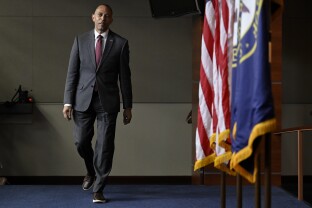The last two weeks have been hard on House Democrats. They saw their poll numbers flagging. They faced fears of losing the Senate and failing to win back the House. They argued with each other, sometimes along racial lines. And their former leader, Nancy Pelosi, eclipsed their current leaders and got most of the credit — or blame — for pushing Joe Biden aside.
Somehow, it’s all worked out well for Hakeem Jeffries.
With “Democrats in disarray” storylines swirling around him, the House minority leader held his cards close, refusing to tip his hand about his preferred path forward for the Biden campaign. He left his public statements in the eye of the beholder, insisting that the Biden-Harris campaign could win but demurring when pressed if the president was best suited to lead the ticket. He met with Biden in private but refused — and refuses — to offer details on what they discussed.
